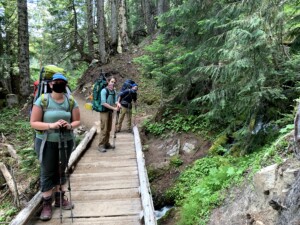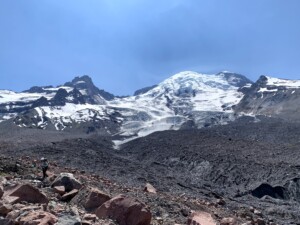While you’re a Earth Science Student at PLU!
Geologic Field Experience
Link to Geologic Field Experience
Research Opportunities
Link to Natural Sciences Undergraduate Research Program
These are PLU-based research opportunities with your Earth Science faculty! The application process typically begins in February for opportunities the following summer. Discuss your interests with your faculty to determine what positions might be available and helpful to you.

2020 Summer Research at Mount Rainier’s Emmons Glacier with students: Bryce Flury, Henry Williams, and Cheyenne Lombardi
Link to NSF Research Experience for Undergraduates
These are summer undergraduate research opportunities on campuses across the United States! The application process is competitive and typically requires recommendation letters – discuss your plans with your faculty so we can support you! Deadlines are typically December – January, so start looking during the fall before the summer you hope to do research.
Professional Societies
Join our professional societies such as the Geological Society of America while you’re a student. Membership provides access to job boards and other professional development resources!
Stay Connected
Join the PLU Earth Science Facebook Group! We post information about events and job opportunities!!
After you graduate!
Careers
Link to Careers
The American Geosciences Institute has developed Career Compasses for different Earth Science career paths, including:
Outreach Coordinator, and many more!
Use PLU’s Career Services site to network with fellow Lutes, get feedback on your professional documents, and search for opportunities!
Licensed Geologist
How to become a licensed geologist in Washington State
As with many fields, the state of Washington and many other states require that professional geologists be licensed in order to assure that the practice of geology safeguards life, health, property, and public welfare. All of the information that you need about the process is available on the following website:
Graduate Study
Information about graduate programs
Different graduate programs have different requirements for the courses that students should have completed before applying. It will vary by graduate program, both between schools and between areas of specialization. You should spend some time investigating the requirements of various schools and programs in the area(s) of your interest. In most cases the most common requirements are the supporting courses in math (calculus), chemistry and physics.
The Geological Society of America has a helpful Guide to Graduate School Admissions in the Geosciences!




Social Media